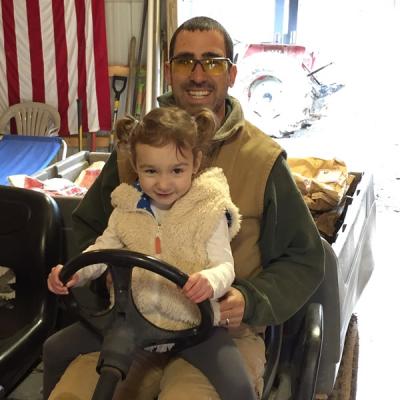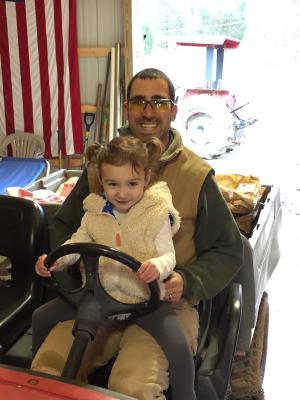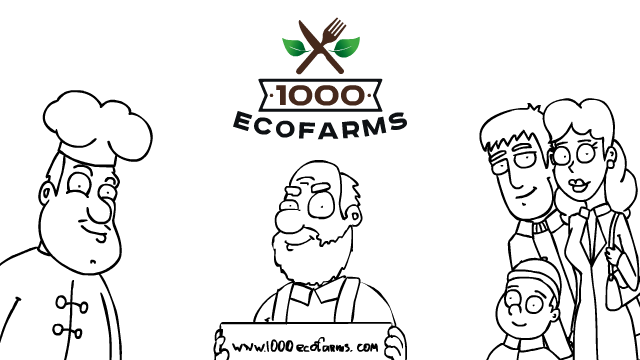Name: Michael Protas, AKA Farmer Mike
Farm: One Acre Farm
Location: Boyds, Maryland
Products: CSA Produce Shares
Farm: One Acre Farm
Location: Boyds, Maryland
Products: CSA Produce Shares
What is one favorite thing about your farm?
My favorite thing about my farm might just be my favorite thing about farming: that it’s not subject specific. To run a successful farm, I need to know a variety of subjects, like mechanics, science, communication, and more. Everything has some sort of a role in farming, whereas in other fields you may only need to know one subject well to succeed, or even to get started. Basically, if you want to know more about the world, farming makes sense because you really do have to learn about everything.
How did you get into farming?
While attending Penn State University in State College, PA—which is surrounded by farms—something drew me to a small CSA (community supported agriculture) right on the outskirts of town. I began interning at a CSA and developed a passion for farming and using organic principles and methods. Upon graduating, I joined the CSA team for a yearlong apprenticeship. Despite my love of agriculture, I moved to NYC to try pursuing my film degree. After two years, and many thoughts of farming, I left the city to work as a CSA-liaison at one of the largest organic farms in Maryland. Eventually, I started my own farming operation and One Acre Farm came to be.
Why is being an eco/local farm important to you?
Years ago I read a book called “Bowling Alone” by Robert D. Putnam. The main takeaway for me was that we as a society are losing our sense of community. After working on a small farm in Pennsylvania—that had such a vibrant community attached to it — I felt like this would be the best course for me to take.
What do you think is the largest problem facing our food system today?
The idea of perfect looking food. If people knew what it takes and what it wastes to make your food look perfect, they would realize that accepting something with some bug holes or a soft spot is really the best way to start repairing the planet.
What do you want non-farmers to know about farming?
A ton of things. First, the perfect food fallacy mentioned above; that organic does NOT mean no fertilizers or no pesticides; what grows in what season; and just how difficult it is to farm. I always tell my members, “We aren't punching plastic widgets in China." We are trying to grow something with every variable under the sun—literally—and no matter how much you know, or how much you think you know, it can change on a dime.
What do you eat for breakfast?
I eat cereal with 2% organic milk and a smoothie with frozen fruit, some greens I grew, and a bunch of other stuff thrown into it!
My favorite thing about my farm might just be my favorite thing about farming: that it’s not subject specific. To run a successful farm, I need to know a variety of subjects, like mechanics, science, communication, and more. Everything has some sort of a role in farming, whereas in other fields you may only need to know one subject well to succeed, or even to get started. Basically, if you want to know more about the world, farming makes sense because you really do have to learn about everything.
How did you get into farming?
While attending Penn State University in State College, PA—which is surrounded by farms—something drew me to a small CSA (community supported agriculture) right on the outskirts of town. I began interning at a CSA and developed a passion for farming and using organic principles and methods. Upon graduating, I joined the CSA team for a yearlong apprenticeship. Despite my love of agriculture, I moved to NYC to try pursuing my film degree. After two years, and many thoughts of farming, I left the city to work as a CSA-liaison at one of the largest organic farms in Maryland. Eventually, I started my own farming operation and One Acre Farm came to be.
Why is being an eco/local farm important to you?
Years ago I read a book called “Bowling Alone” by Robert D. Putnam. The main takeaway for me was that we as a society are losing our sense of community. After working on a small farm in Pennsylvania—that had such a vibrant community attached to it — I felt like this would be the best course for me to take.
What do you think is the largest problem facing our food system today?
The idea of perfect looking food. If people knew what it takes and what it wastes to make your food look perfect, they would realize that accepting something with some bug holes or a soft spot is really the best way to start repairing the planet.
What do you want non-farmers to know about farming?
A ton of things. First, the perfect food fallacy mentioned above; that organic does NOT mean no fertilizers or no pesticides; what grows in what season; and just how difficult it is to farm. I always tell my members, “We aren't punching plastic widgets in China." We are trying to grow something with every variable under the sun—literally—and no matter how much you know, or how much you think you know, it can change on a dime.
What do you eat for breakfast?
I eat cereal with 2% organic milk and a smoothie with frozen fruit, some greens I grew, and a bunch of other stuff thrown into it!






